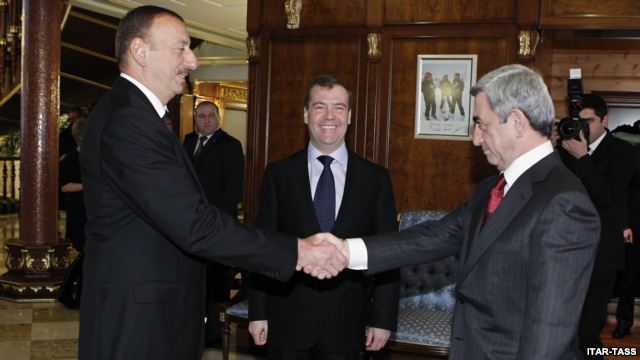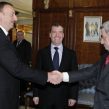
Aliyev-Sargsyan Summit in Sochi: No Credible Prospects for Russian Mediation
Publication: Eurasia Daily Monitor Volume: 9 Issue: 25
By:

The first summit for seven months between Armenia President Serzh Sargsyan and his Azerbaijani counterpart Ilham Aliyev was held on January 23 in Sochi, and mediated by Russian President Dmitry Medvedev (as in all previous eight meetings in the past three years). After his failure to bring the parties to a framework peace deal, and his subsequent decision not to run for a second term in office, this time Medvedev was willing to portray his years of teambuilding with Aliyev and Sargsyan as a successful effort in preserving the ceasefire, rather than a failed search for a comprehensive solution.
However, the considerable amount of work done by Russians to revive the talks should be acknowledged, though dysfunctional since the summer of 2011. In November 2011, Azerbaijani and Armenian religious leaders – Allahshukur Pashazada and Garegin II – met in Yerevan with mediation by Patriarch Kirill, the head of the Russian Orthodox Church, thus laying the foundation for a new summit. In December 2011, the Azeri and Armenian foreign ministers met in Vilnius on the sidelines of an OSCE conference. A joint statement on the current status and the future of the talks came from the three co-chairs of the Minsk Group in Vilnius. The statement contained nothing new, referenced to past mediation statements, and routinely noted the treaties to frame the future peace accord. The two foreign ministers briefly flew to Moscow on January 17 and 19, respectively, to finalize preparations for the summit with the Russian Foreign Minister, Sergei Lavrov.
The factors that, despite heavy odds, could have led to progress during the January 23 Sochi Summit, mostly favored Azerbaijan. Currently, Baku is in an active phase of negotiations with Moscow on the future of the Qabala radar station, as the latter’s term of lease expires in less than one year. Azerbaijani officials, through their proxy media commentators, do not disguise their intent to use the radar as a bargaining tool (https://www.zerkalo.az/2011-12-15/politics/25565, December 15, 2011). In bargaining with the Kremlin, Baku may also be tempted to use its non-permanent membership in the UN Security Council, which commenced several weeks ago. Lastly, only minutes before the Armenia-Azerbaijan summit, Gazprom and SOCAR signed a deal to double gas sales from Azerbaijan to Russia in 2012, to reach three billion cubic meters.
By contrast there were apparent weaknesses on the part of Yerevan. President Sargsyan’s party is preparing for real competition in the May 2012 parliamentary elections, and therefore has to please the Russians, who firmly control Armenian domestic politics, if he wants to retain power. Moreover, 2013 will be one of the worst years for Armenia in terms of servicing its foreign debt. Without Russian financial backing that task will be a great challenge to President Sargsyan seeking re-election in the same year.
Still, Baku has also made compromises. A few days in advance of the meeting, on January 18, Bayram Safarov, the leader of the Azerbaijani community in Karabakh, voiced for the first time “the only” condition on which his community would agree to a referendum in Karabakh. That condition is the return of members of the community to “their homeland” (https://en.trend.az/news/karabakh/1981674.html, January 18).
However, a miracle did not occur. The three presidents only made a bland statement, which confirmed pessimistic expectations. As recently as in December 2011, France had formally replaced its co-chair in the Minsk Group, Bernard Fassier, with Jacques Fauer, thus reinforcing suggestions that success in the talks was nowhere near. If there were realistic chances to achieve a lasting peace settlement in the near future, the long-standing career diplomat Bernard Fassier would hardly have been replaced.
Years of failure in Russian guidance in the talks, although conducted with the consent of the other co-chairs – the US and France – has left Azerbaijan in an awkward situation. On the one hand, President Aliyev is certainly not impressed by the work of the co-chairs. On the other hand, he was not in a position to support Turkish President Abdullah Gul’s December 2011 discontent with France’s performance. With Moscow leading the talks almost unilaterally, such criticism would have sounded like the voice of a pro-Russian party within Azerbaijan’s political elite, which Aliyev would rather prefer to balance in his policy (Trend News Agency, Hurriyet Daily News, December 26, 2011).
There are reasons as to why Azerbaijan should distrust the Minsk group. In December 2011 alone: the US President Barack Obama was unable to appoint an ambassador to Azerbaijan because of domestic pressure in the US by Armenian diaspora organizations on the US Congress; the French parliament and President Nicolas Sarkozy played every possible pro-Armenian political game against Turkey (and Azerbaijan) by working toward the criminalization of the denial of the alleged Armenian “genocide” in the Ottoman Empire; and Russia has strengthened its already strong military and political alliance with Armenia by moving toward economic integration under the “Eurasian Union” initiative.
The United States and France have tolerated Russia leading the talks, because they are the only co-chairs interested in any solution acceptable to both sides, provided that no military dominance by Russia is part of the solution. Moscow is arguably willing to keep the conflict alive, in order to maintain its own military presence in the South Caucasus. One can expect that Paris and Washington will become more proactive, if and when Moscow fully discredits its mediation capability.
Baku’s interest in Paris and Washington becoming more active co-chairs was clear immediately following the collapse of the summit in Kazan in July 2011. Deputy Foreign Minister Araz Azimov, in his scandalous interview with Echo Moskvy, made statements in total dissonance with the traditional rhetorical set of Russian-Azerbaijani diplomacy. He said that Azerbaijan was concerned by the Russian military presence in Armenia, and suggested the Russians must change the overall design of their presence in South Caucasus by turning from “militarist” to economic tools (Echo Moskvy, July 19, 2011).
To prevent the other two co-chairs from assuming the lead role, Moscow fills all trilateral documents coming from Aliyev-Medvedev-Sargsyan meetings with praise for Russian mediation. The January 23 meeting was no exception.




